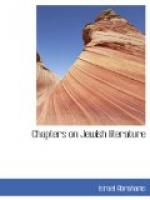In the very year of Ibn Gebirol’s death Moses Ibn Ezra was born. Of his life little is certain, but it is known that he was still alive in 1138. He is called the “poet of penitence,” and a gloomy turn was given to his thought by an unhappy love attachment in his youth. A few stanzas of one of his poems run thus:
Sleepless, upon my bed the
hours I number,
And, rising, seek the house
of God, while slumber
Lies heavy on men’s
eyes, and dreams encumber
Their souls in visions of
the night.
In sin and folly passed my
early years,
Wherefore I am ashamed, and
life’s arrears
Now strive to pay, the while
my tears
Have been my food by day and
night.
* * * * *
Short is man’s life,
and full of care and sorrow,
This way and that he turns
some ease to borrow,
Like to a flower he blooms,
and on the morrow
Is gone—a vision
of the night.
How does the weight of sin
my soul oppress,
Because God’s law too
often I transgress;
I mourn and sigh, with tears
of bitterness
My bed I water all the night.
* * * * *
My youth wanes like a shadow
that’s cast,
Swifter than eagle’s
wings my years fly fast,
And I remember not my gladness
past,
Either by day or yet by night.
Proclaim we then a fast, a
holy day,
Make pure our hearts from
sin, God’s will obey,
And unto him, with humbled
spirit pray
Unceasingly, by day and night.
May we yet hear his words:
“Thou art my own,
My grace is thine, the shelter
of my throne,
For I am thy Redeemer, I alone;
Endure but patiently this
night!”
But his hymns, many of which won a permanent place in the prayer-book, are not always sad. Often they are warm with hope, and there is a lilt about them which is almost gay. His chief secular poem, “The Topaz” (Tarshish), is in ten parts, and contains 1210 lines. It is written on an Arabic model: it contains no rhymes, but is metrical, and the same word, with entirely different meanings, occurs at the end of several lines. It needs a good deal of imagination to appreciate Moses Ibn Ezra, and this is perhaps what Charizi meant when he called him “the poet’s poet.”
Another Ibn Ezra, Abraham, one of the greatest Jews of the Middle Ages, was born in Toledo before 1100. He passed a hard life, but he laughed at his fate. He said of himself:
If I sold shrouds,
No one would die.
If I sold lamps,
Then, in the sky,
The sun, for spite,
Would shine by night.
Several of Abraham Ibn Ezra’s hymns are instinct with the spirit of resignation. Here is one of them:
I hope for the salvation of
the Lord,
In him I trust,
when fears my being thrill,
Come life, come death, according
to his word,
He is my portion
still.




